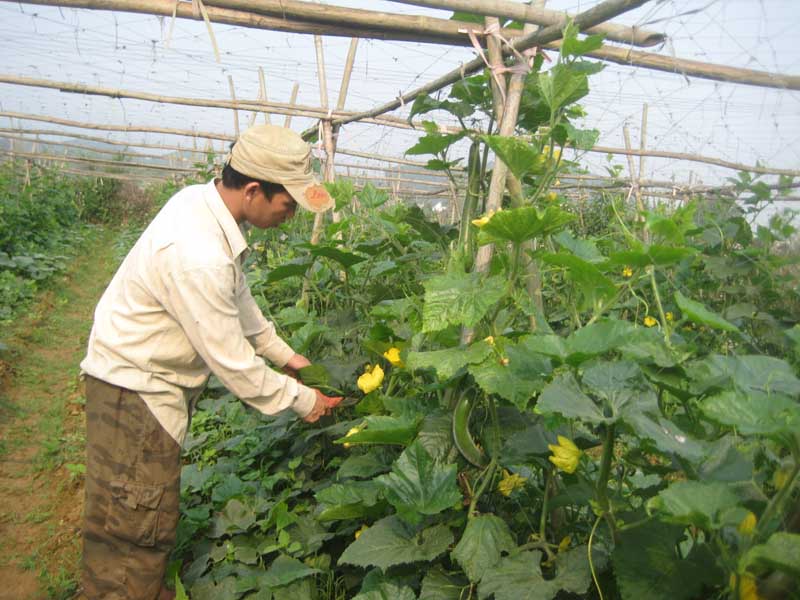
(HBO) – Lac Thuy district in the northern mountainous province of Hoa Binh aims to have from 150 – 200 hectares of safe vegetables by 2020, with more than half of the products to be sold outside the province. To that end, the province has implemented the planning on centralised production areas, built mechanised application models and applied VietGAP standards in communes, especially those with big areas of crops.
The Lac Long safe
vegetable cooperative is one of the largest waxy pumpkin production areas in
Lac Thuy district.
Currently, Lac Thuy has over 4.5 hectares of safe vegetables, mostly in Lac
Long and Dong Tam communes. After more than two years of implementation of the
project on restructuring the agricultural sector towards higher added value and
sustainable development in Lac Thuy district during 2016-2020, local people’s
lives have been ensured. Many models of safe vegetable production models have each
generated more than 100 million VND annually, contributing to raising income
and generating jobs for local people.
The district mainly cultivates high-value industrial plants like waxy pumpkin,
pumpkin and chili. The total area of chili in the district exceeds 12 hectares,
mainly in Dong Tam, Chi Ne and Khoan Du communes with a cumulative area
amounting to 5 hectares.
To ensure product consumption for local farmers, Lac Thuy signed a contract
with Vietnam Chili Ltd., Co. which buys all products of local farmers with a
price of 5,500 VND per kg. The company even purchases the products with a price
equivalent to 80 percent of market price in case of price changes.
Apart from chili, Lac Thuy has also expanded production on waxy pumpkin and
pumpkin. The district now has 10.5 hectares of pumpkin in Lac Long and Hung Thi
communes. This year, round pumpkins were
sold to Truong Son JSC at a price of 3,500 VND per kg. /.
Dao Village’s honey – a product certified with a 3-star OCOP (One Commune One Product) rating by Thong Nhat Agricultural Cooperative in Dao Village (Hoa Binh City) – is highly regarded by consumers for its quality, richness, and variety in packaging. The distinctively sweet taste of Dao Village’s honey leaves a lasting impression on anyone who has tried it.
In alignment with Project No. 07-DA/TU, issued by the Hoa Binh provincial Party Committee on November 1, 2021, Lac Thuy district has actively promoted investment and supported the sustainable development of its industrial and handicraft sectors during the 2021–2025 period. Alongside this, the district has remained committed to preserving and revitalising traditional craft villages.
Located in the northern part of Lac Thuy district, with a temperate climate and fertile soil, Phu Thanh commune has great potential and advantages in growing tea. The long-standing experience, combined with strict adherence to organic farming practices in the tea gardens, ensures that the dried tea products from Phu Thanh and Lac Thuy as a whole are sold out immediately upon production, providing a stable and prosperous life for the local people.
Amid efforts to streamline the administrative apparatus, Hoa Binh province has intensified measures to address challenges in land clearance, resettlement support, and infrastructure investment, aiming to speed up the progress of key projects.
Hoa Binh province has posted an unprecedented economic growth rate of 12.76% in the first quarter of 2025, marking its highest quarterly performance to date and positioning it as the second fastest-growing locality in the country, trailing only Bac Giang province.
Under current regulations, products in the One Commune – One Product (OCOP) programme that are rated three stars or higher must undergo re-evaluation every three months. However, in reality, some of these products fail to consistently meet the required standards, raising concerns about the sustainability of their OCOP certification. This underscores the urgent need for producers to enhance product quality and gradually develop their OCOP products into strong, marketable brands.



